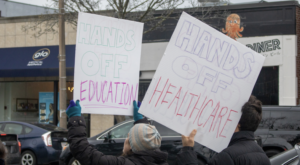The COVID-19 pandemic has challenged the financial situation of many Newtonian households, with a disproportionate impact on people of color, according to the Newton community needs assessment, which outlines the results of community-wide surveys and focus groups about the needs of underrepresented groups in the city.
“It feels like they’re trying to push lower-income people out of Newton,” the assessment reads, quoting an unspecified Newton resident.
The Newton Programs & Services Committee convened on Wednesday evening to discuss the assessment, among other topics.
The city ordered the assessment—authored by the Center for Governmental Research (CGR)—to help determine the allocation of American Rescue Plan Act funds.
Josephine McNeil, an executive director of Citizens for Affordable Housing in Newton Development Organization, said that Newton lacks local investments into low-income services.
“Most of the services that are provided by the city for low-income people come from the federal government,” McNeil said. “Why in a community as wealthy as this one [are] there … minimal amounts of funding from the taxpayers?”
McNeil also challenged the lack of discussion about challenges that Black Newtonians face.
More Black Newtonians responded that they are affected by challenges posed by the COVID-19 pandemic than white residents, according to the report. Sixty percent of Black residents reported challenges paying bills during the pandemic, while only 22 percent of white residents reported the same challenges, according to the report.
McNeil said nobody questioned the findings in the report that showed the pandemic disproportionately affected Black residents.
“This community just refuses to talk about race with respect to many of these issues,” she said. “Of all of the issues that came out with respect to the report and the process, nowhere was the word ‘people of color’ mentioned—the term was continuously ‘lower resourced.’ And this is after we have money that focuses on the disproportionate impact of people of color.”
The committee also asked municipal departments responsible for outreach to the community to explain their methods of assisting disadvantaged groups such as immigrants, seniors, disabled individuals, and families with disabled children.
Director of Social Services for the city Meghan Kennedy and Case Manager for Newton Senior Services outlined the different assistance services offered to Newton residents. The presentation was divided into separate parts outlining economic, emotional, senior, and housing assistance that the city provides. Newton’s outreach ranges from housing grants and fuel assistance to emotional support groups, health classes, and narcan training.
“We do the best with what we’ve got, but we’re always looking for additional resources,” Kennedy said.
Holly Ryan, Ward 8 city councilor, questioned CGR’s methodology in creating the report.
“In the graph that described the income of respondents, 38 percent had income over 100,000 [dollars],” Ryan said. “I was just wondering why such a large percentage of folks were included in a survey intended for the most vulnerable folks. I just think offhand it would have been more helpful to have more folks in need be part of this study.”
Featured Image by Nicole Vagra / Heights Editor




